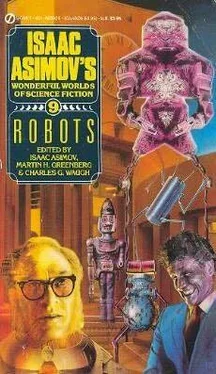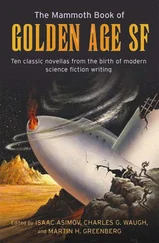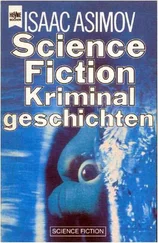Frederik Pohl - Isaac Asimov's Worlds of Science Fiction. Book 9 - Robots
Здесь есть возможность читать онлайн «Frederik Pohl - Isaac Asimov's Worlds of Science Fiction. Book 9 - Robots» весь текст электронной книги совершенно бесплатно (целиком полную версию без сокращений). В некоторых случаях можно слушать аудио, скачать через торрент в формате fb2 и присутствует краткое содержание. Год выпуска: 1989, ISBN: 1989, Издательство: Robinson Publishing, Жанр: Фантастика и фэнтези, на английском языке. Описание произведения, (предисловие) а так же отзывы посетителей доступны на портале библиотеки ЛибКат.
- Название:Isaac Asimov's Worlds of Science Fiction. Book 9: Robots
- Автор:
- Издательство:Robinson Publishing
- Жанр:
- Год:1989
- ISBN:ISBN: 1-85487-041-6
- Рейтинг книги:4 / 5. Голосов: 1
-
Избранное:Добавить в избранное
- Отзывы:
-
Ваша оценка:
- 80
- 1
- 2
- 3
- 4
- 5
Isaac Asimov's Worlds of Science Fiction. Book 9: Robots: краткое содержание, описание и аннотация
Предлагаем к чтению аннотацию, описание, краткое содержание или предисловие (зависит от того, что написал сам автор книги «Isaac Asimov's Worlds of Science Fiction. Book 9: Robots»). Если вы не нашли необходимую информацию о книге — напишите в комментариях, мы постараемся отыскать её.
Isaac Asimov's Worlds of Science Fiction. Book 9: Robots — читать онлайн бесплатно полную книгу (весь текст) целиком
Ниже представлен текст книги, разбитый по страницам. Система сохранения места последней прочитанной страницы, позволяет с удобством читать онлайн бесплатно книгу «Isaac Asimov's Worlds of Science Fiction. Book 9: Robots», без необходимости каждый раз заново искать на чём Вы остановились. Поставьте закладку, и сможете в любой момент перейти на страницу, на которой закончили чтение.
Интервал:
Закладка:
From beyond the ship he could hear another section of the waiting queue filing in-the last, he hoped, of the day. He settled himself as comfortably as he could. In a moment the lecture would begin. He had to smile when he thought of one thing the recording would say.
Then there it was again-the clear, trained voice of the chap Stillwell. The foot scrapings and whispers of the crowd died away, and Cliff could hear every word in spite of the great bulk of the ship lying interposed.
"Ladies and gentlemen," began the familiar words, "the Smithsonian Institution welcomes you to its new Interplanetary Wing and to the marvelous exhibits at this moment before you."
A slight pause. "All of you must know by now something of what happened here three months ago, if indeed you did not see it for yourself in the telescreen," the voice went on. "The few facts are briefly told. A little after 5:00 P. M. on September sixteenth, visitors to Washington thronged the grounds outside this building in their usual numbers and no doubt with their usual thoughts. The day was warm and fair. A stream of people was leaving the main entrance of the museum just outside in the direction you are facing. This wing, of course, was not here at that time. Everyone was homeward bound, tired no doubt from hours on their feet, seeing the exhibits of the museum and visiting the many buildings on the grounds nearby. And then it happened.
"On the area just to your right, just as it is now, appeared the time-space traveler. It appeared in the blink of an eye. It did not come down from the sky; dozens of witnesses swear to that; it just appeared. One moment it was not here, the next it was. It appeared on the very spot it now rests on.
"The people nearest the ship were stricken with panic and ran back with cries and screams. Excitement spread out over Washington in a tidal wave. Radio, television, and newspapermen rushed here at once. Police formed a wide cordon around the ship, and army units appeared and trained guns and ray projectors on it. The direst calamity was feared.
"For it was recognized from the very beginning that this was no spaceship from anywhere in the solar system. Every child knew that only two spaceships had ever been built on Earth, and none at all on any of the other planets and satellites; and of those two, one had been destroyed when it was pulled into the sun, and the other had just been reported safely arrived on Mars. Then, the ones made here had a shell of a strong aluminum alloy, while this one, as you see, is of an unknown greenish metal.
"The ship appeared and just sat here. No one emerged, and there was no sign that it contained life of any kind. That, as much as any single thing, caused excitement to skyrocket. Who, or what, was inside? Were the visitors hostile or friendly? Where did the ship come from? How did it arrive so suddenly right on this spot without dropping from the sky?
"For two days the ship rested here, just as you now see it, without motion or sign that it contained life. Long before the end of that time the scientists had explained that it was not so much a spaceship as a space-time traveler, because only such a ship could arrive as this one did-materialize. They pointed out that such a traveler, while theoretically understandable to us Earthmen, was far beyond attempt at our present state of knowledge, and that this one, activated by relativity principles, might well have come from the far comer of the Universe, from a distance which light itself would require millions of years to cross.
"When this opinion was disseminated, public tension grew until it was almost intolerable. Where had the traveler come from? Who were its occupants? Why had they come to Earth? Above all, why did they not show themselves? Were they perhaps preparing some terrible weapon of destruction?
"And where was the ship's entrance port? Men who dared go look reported that none could be found. No slightest break or crack marred the perfect smoothness of the ship's curving ovoid surface. And a delegation of high-ranking officials who visited the ship could not, by knocking, elicit from its occupants any sign that they had been heard.
"At last, after exactly two days, in full view of tens of thousands of persons assembled and standing well back, and under the muzzles of scores of the army's most powerful guns and ray projectors, an opening appeared in the wall of the ship, and a ramp slid down, and out stepped a man, godlike in appearance and human in form, closely followed by a giant robot. And when they touched the ground the ramp slid back and the entrance closed as before."
"It was immediately apparent to all the assembled thousands that the stranger was friendly. The first thing he did was to raise his right arm high in the universal gesture of peace; but it was not that which impressed those nearest so much as the expression on his face, which radiated kindness, wisdom, the purest nobility. In his delicately tinted robe he looked like a benign god.
"At once, waiting for this appearance, a large committee of high-ranking government officials and army officers advanced to greet the visitor. With graciousness and dignity the man pointed to himself, then to his robot companion, and said in perfect English with a peculiar accent, 'I am Klaatu,' or a name that sounded like that, 'and this is Gnut. ' The names were not well understood at the time, but the sight-and-sound film of the television men caught them and they became known to everyone subsequently.
"And then occurred the thing which shall always be to the shame of the human race. From a treetop a hundred yards away came a wink of violet light and Klaatu fell. The assembled multitude stood for a moment stunned, not comprehending what had happened. Gnut, a little behind his master and to one side, slowly turned his body a little toward him, moved his head twice, and stood still, in exactly the position you now see him.
"Then followed pandemonium. The police pulled the slayer of Klaatu out of the tree. They found him mentally unbalanced; he kept crying that the devil had come to kill everyone on Earth. He was taken away, and Klaatu, although obviously dead, was rushed to the nearest hospital to see if anything could be done to revive him. Confused and frightened crowds milled about the Capitol grounds the rest of the afternoon and much of that night. The ship remained as silent and motionless as before. And Gnut, too, never moved from the position he had come to rest in.
"Gnut never moved again. He remained exactly as you see him all that night and for the ensuing days. When the mausoleum in the Tidal Basin was built, Klaatu's burial services took place where you are standing now, attended by the highest functionaries of all the great countries of the world. It was not only the most appropriate but the safest thing to do, for if there should be other living creatures in the traveler, as seemed possible at that time, they had to be impressed by the sincere sorrow of us Earthmen at what had happened. If Gnut was still alive, or perhaps I had better say functionable, there was no sign. He stood as you see him during the entire ceremony. He stood so while his master was floated out to the mausoleum and given to the centuries with the tragically short sight-and-sound record of his historic visit. And he stood so afterward, day after day, night after night, in fair weather and in rain, never moving or showing by any slightest sign that he was aware of what had gone on.
"After the interment, this wing was built out from the museum to cover the traveler and Gnut. Nothing else could very well have been done, it was learned, for both Gnut and the ship were far too heavy to be moved safely by any means at hand.
"You have heard about the efforts of our metallurgists since then to break into the ship, and of their complete failure. Behind the ship now, as you can see from either end, a partitioned workroom has been set up where the attempt still goes on. So far its wonderful greenish metal has proved inviolable. Not only are they unable to get in, but they cannot even find the exact place from which Klaatu and Gnut emerged. The chalk marks you see are the best approximation.
Читать дальшеИнтервал:
Закладка:
Похожие книги на «Isaac Asimov's Worlds of Science Fiction. Book 9: Robots»
Представляем Вашему вниманию похожие книги на «Isaac Asimov's Worlds of Science Fiction. Book 9: Robots» списком для выбора. Мы отобрали схожую по названию и смыслу литературу в надежде предоставить читателям больше вариантов отыскать новые, интересные, ещё непрочитанные произведения.
Обсуждение, отзывы о книге «Isaac Asimov's Worlds of Science Fiction. Book 9: Robots» и просто собственные мнения читателей. Оставьте ваши комментарии, напишите, что Вы думаете о произведении, его смысле или главных героях. Укажите что конкретно понравилось, а что нет, и почему Вы так считаете.









